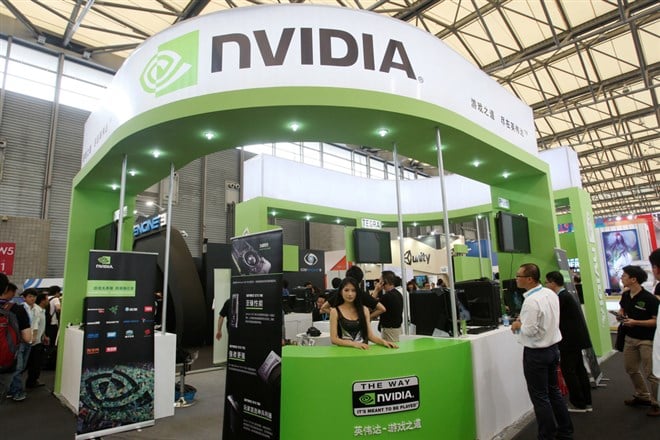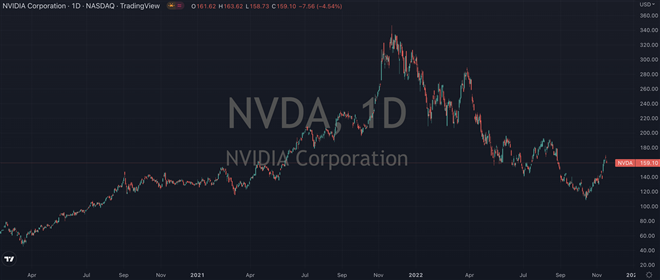 In yesterday’s column we wrote about how the semiconductor industry has had a tough first half of the year, but how at the same time there’s a growing bull case around some of the strong names in the space such as Advanced Micro Devices (NASDAQ: AMD). Today we’ll take a closer look at a stock that’s almost always featured beside AMD as one of the more solid semiconductor names out there, and that's Nvidia (NASDAQ: NVDA).
In yesterday’s column we wrote about how the semiconductor industry has had a tough first half of the year, but how at the same time there’s a growing bull case around some of the strong names in the space such as Advanced Micro Devices (NASDAQ: AMD). Today we’ll take a closer look at a stock that’s almost always featured beside AMD as one of the more solid semiconductor names out there, and that's Nvidia (NASDAQ: NVDA). Through the first week of this month, their shares had fallen a full 60% from the all-time high they tagged last November. This brutal correction has to first be acknowledged by anyone thinking about backing them to start an uptrend in the near future. A deadly combination of inflation, recession fears and a supply glut have formed the perfect storm for semiconductors like Nvidia, and their stock has suffered accordingly as a result. But while it’s unlikely that these factors will be around forever, they’re definitely not going to disappear anytime soon. But if we look at the bigger picture, it’s clear the risk/reward profile is starting to support the argument for a longer-term position being considered.
Fundamental Industry Shifts
For starters, legislation to aid the semiconductor industry passed a key procedural vote in the U.S. Senate yesterday, when Senate voted 64-34 to advance the bill some have called Chips-plus. The pending legislation would give roughly $54 billion in subsidies to encourage manufacturers to build foundries in the U.S. and a new, four-year 25% tax credit to encourage companies to build semiconductor plants in the U.S. This fresh fundamental tailwind, boosted the momentum that was already appearing in Nvidia shares from the bullish comments out of UBS last week.
The team there listed Nvidia as one of their favorite semiconductor stocks, despite the fact that near-term risks remain in the form of weakening consumer demand and confidence and rising inventories. Analyst Timothy Arcuri is a fan of Nvidia as it goes about building "more stable revenue sources" around its GPU and software moats. He also feels the strength in the data center that has been talked about recently could be strong enough to provide a cushion if there is a correction in gaming.
This theme of simultaneous strength and weakness was also picked up on by the team over at Citi earlier this month as well. Analyst Atif Malik there reiterated his Buy rating on Nvidia shares, but lowered adjusted earnings in 2022, 2023 and 2034 by 9%, 7% and 5%, respectively due to what he called a potential correction in gaming-related revenue. He also cited "below seasonal PC demand" and elevated inventory at retail.
60% Upside
Still, his $285 price target suggests there’s upside to be had in the region of 60% from where shares closed on Wednesday. Given they’ve already tagged the solid line of support from 2021 and 2020 around the $140 mark, you have to be thinking they’re more focused on testing upside resistance as a next step. Indeed, the 25% rally seen in their shares since the first week of July is testament to this potential turnaround that’s getting underway. We’ll have to wait and see if there’s enough weight behind it to break the multi-month downtrend that shares are in, but for now it’s looking promising. Compared to the tech-heavy NASDAQ index over the past three weeks, Nvidia shares have more than 3x’d the 7% jump in the NASDAQ.
Regardless of the near-term headwinds, this is still a company reporting year-on-year quarterly revenue growth of close to 50%, even in an environment that has both rising interest rates and red hot inflation prints. That’s impressive in any language. From a technical perspective, there’s plenty to like about shares down here as well, so if you’ve managed to avoid becoming a bag holder of semiconductor stocks since last year, there’s every reason to think both Nvidia, like AMD, is quite oversold at its current levels. We like both of them from a fundamental and technical perspective, and believe the long term potential from current levels could more than justify the short term risk of ownership.




